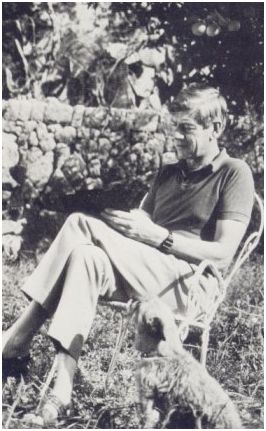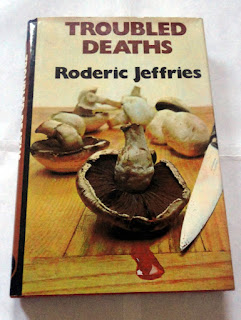Because of
neighbors who've
become hypersensitized to my sonorous emoting while engrossed in
crime novels, I nearly choked trying to stifle cheers when Geoffrey
Freeman dies a slow, extremely agonizing death. But it was Sunday and
my nearest neighbors—the next-door beauty parlor folks—were not
in, so my yays disturbed no one enough to bang on the pasteboard-thin
partition or call 911.
But then,
as it so often seems, complications appear. The chief suspect,
homely, awkward spinster Mabel Cannon, whose affections for Geoffrey
had been cruelly spurned, soon thereafter also dies a slow, extremely
agonizing death. Autopsies
indicate the two had been poisoned by a lethal mushroom known as
llargsomi,
which closely resembles the delectably edible esclatasang.
They grow wild in proximity to one another on Spain’s Balearic
island of Mallorca, but no Mallorquin would ever mistake the one for
the other—or so all likely suspects assure Inspector Enrique
Alvarez, himself a Mallorquin, assigned to investigate the presumed
murders of the two transplanted English residents.
Whereas the
pulse of other fictional detectives predictably would quicken as a
plot such as this thickens, Geoffrey’s autopsy, disproving the
initial theory he’d died of cholera, drives Alvarez to drink. The
game afoot for him leads straight to the nearest cafe for a brandy or
three. And the brandies continue as each Mallorquin he questions
welcomes him with spirits and bonhomie, and more spirits. Neither he
nor any of those he interviews expresses any love for the
English. “I’ll tell you one thing,” he confides over a glass of
brandy to Ramez, his cousin’s husband, “if I had the chance I’d
bump off all the English for nothing.”
The only
fictional police detective I know of whose drinking legs are in
league with
Alvarez’s
is Arkady
Renko,
Martin Cruz Smith’s vodka-swilling Moscow cop who at least has an
excuse, being beaten, frozen, irradiated, stabbed, and shot in the
line of duty. Obese and physically unfit to play any TV cop other
than Chief Ironside, Alvarez does catch some verbal abuse, but it’s
from his superior, a Spaniard from Madrid, who first orders Alvarez
to root out and destroy all llargsomi on the island, then, when told
how impossible that would be, orders him to arrest somebody—anybody,
it would seem. “That popinjay!” Alvarez’s cousin tells him.
“What does he know about anything? If he isn’t satisfied with the
way things are done on this island, why doesn’t he go back to
Madrid?”
For all
that, even though Alvarez does solve the murders, he hasn’t made
any
arrests in the three books of the series I’ve read thus far.
Mallorquin justice, perhaps, or Roderic Jeffries’s clever
plotting...or maybe the boss from Madrid has a point.
 |
| Roderic Jeffries |
One thing
is beyond speculation:
Alvarez
is an almost hopeless romantic. We learn more in Troubled
Deaths
about Juana-Maria, the love of his life he lost in an as yet
unexplained fatal encounter with a motor vehicle. We’ve gotten
incremental bits of the story in each episode, just enough to lure
one further into the series. His fantasy surrogate Juana-Maria in
this story is poor Mabel Cannon’s only friend, Caroline Durrel,
whom Alvarez presumably would exempt from his
bumping-off-Mallorca’s-English-inhabitants fantasy.
“It
wasn’t her looks, thought Alvarez with bewilderment, although she
was as beautiful as an orange grove at blossom time. It wasn’t that
she promised that ripe, earthy experience which twisted a man’s
soul–she didn’t. It was because there was an air of simple
goodness about her which reminded him with aching intensity of
Juana-Maria.”
Not that
Alvarez turned up his nose--“broad enough to make a landing space
for a squadron of flies”--at the idea of earthy experience. He
muses that “these days most young women whether standing or walking
struck him as erotic...The tragedy
of middle age
was that a man still dreamed, but the volcano in his belly had died
down to just a little camp fire.”
Staring
into a bar mirror at one of his ubiquitous haunts, he sees “a
middle-aged man with lined, coarsely featured face, whose eyes were
bloodshot and whose hair was beginning to thin. You simple fool, he
[says] to his reflection. You, a failure, a peasant without a single
cuarterada of land to call his own, old enough to be her father...But
her
golden image continued
to dance in his mind...When he had looked at her he had seen the
quiet moon in the star-studded sky, the sparkling of still seas, the
distant mountains framed against a sunset sky. And when she had
looked at him, what had she seen? An
ugly, time-scarred peasant.”
A man who
knows his limitations, as Harry Callahan, another fictional cop once
said, but, as yet another, Colombo, knew, who uses humility to his
advantage. When he comes upon an English murder suspect in Caroline’s
company, the suspect insults Alvarez, presuming the detective doesn’t
speak English. I easily imagined Peter Falk’s New
York
accent and humble dissembling in the Mallorquin’s response:
“ ‘I speak a very little, señor, but that little not very well,’
said Alvarez, with the self-deprecating politeness which in Spain
sometimes took the place of rudeness. ‘I fear I make many
mistakes.’ ”
Caroline comes to his rescue.
“ ‘Well,’ she says, ‘it sounds to me as if you speak it
wonderfully well...I only wish I could speak Spanish half as well.’
Her eyes were deep blue where Juana-Maria’s had been dark brown,
yet to look into them was to look at what had lain in Juana-Maria’s.”
It’s a long series,
friends--some three dozen episodes, and not all are on Kindle. Woe is
the curious romantic in me.

I am looking forward to trying book 1 in the series, your reviews intrigue me. I am glad you are liking them so much.
ReplyDeleteI know you'll like Alvarez, Tracy. I wish I could just drop everything and read the entire series, but the neighbors would have me committed. I must take them gradually. Just finished book #1 in the Chief Inspector Porfiry Rostnikov series, thanks to your recommendation. I'll write it up for next Friday. I liked it, tho it's quite different from the Arkady Renkdo books.
Delete